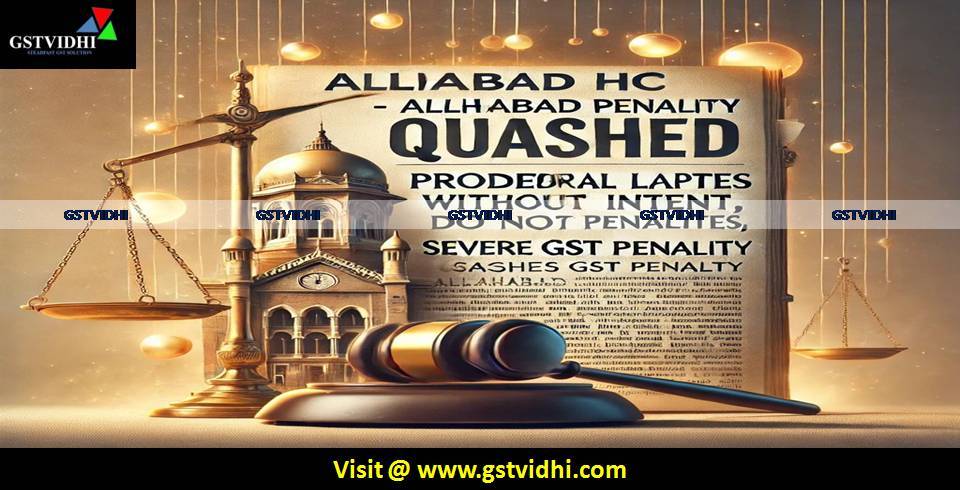
Procedural lapses without
intent, do not warrant severe penalties
- Allahabad HC Quashes GST Penalty
By Yogesh Verma (CS/LLB) / 2 min read / GST Case Law
Introduction
The case of M/s AA Plastics Pvt. Ltd. vs. Additional Commissioner Grade 2
& Others examines the legality of imposing penalties under Section 129
of the CGST Act, 2017, for the expiry of an e-way bill during goods transit.
This judgment, delivered by the Allahabad High Court on August 2, 2024,
highlights the importance of intent in determining tax evasion and clarifies
procedural safeguards for taxpayers under the GST regime.
Case Details
- Court: High Court of Allahabad
- Judge: Hon’ble Justice Piyush Agrawal
- Case
Number: Writ Tax No. 1006 of 2022
- Judgment
Date: August 2, 2024
- Parties:
- Petitioner:
M/s AA Plastics Pvt. Ltd.
- Respondent:
Additional Commissioner Grade 2, Commercial Tax/State Tax, Agra
Background of the Case: M/s AA Plastics Pvt. Ltd., a GST-registered manufacturer of
LD polythene sheets and bags, dispatched goods on August 5, 2021, to M/s Benara
Udyog Limited, Agra. The goods were transported via M/s New Mallik Transport
Commission Agency, supported by valid tax invoices and an e-way bill.
Key Events
1.
Expiry of
E-Way Bill: The e-way bill expired during
transit as the truck driver deviated from the route to attend to a personal
matter. The petitioner generated an amended e-way bill on August 8, 2021, but
the goods were intercepted on August 9, 2021, before its presentation.
2.
Detention
and Penalty: The authorities detained the
goods, citing an expired e-way bill. Despite the petitioner presenting the
amended e-way bill, the authorities imposed penalties under Section 129 of the
CGST Act.
3.
Appeals: The petitioner’s appeal against the penalty was dismissed
by the Additional Commissioner, leading to the filing of this writ petition.
Legal Framework
Section 129 of the CGST Act
1.
Governs the detention, seizure, and
release of goods during transit for non-compliance with GST provisions.
2.
Imposes penalties for procedural
violations, irrespective of intent.
Section 130 of the CGST Act
Deals with confiscation of goods or conveyances and levies
penalties for intent-based violations, such as tax evasion.
Judicial Precedent
- In
Shyam Sel and Power Ltd. vs. State of U.P., the Allahabad High
Court held that penalties under Section 129 must establish intent to evade
tax.
- Procedural
lapses without intent should invoke lesser penalties under Section 122
instead of detention under Section 129.
Issues Raised
1.
Whether the mere expiry of an e-way
bill warrants penalties under Section 129 of the CGST Act.
2.
Whether intent to evade tax is a
prerequisite for imposing penalties under Section 129.
3.
Whether the authorities erred in
dismissing the petitioner’s defense despite presenting an amended e-way bill.
Submissions by the Parties
Petitioner’s Arguments
1.
No Intent
to Evade Tax: The petitioner argued that the
expiry of the e-way bill was a procedural lapse without any intention to evade
tax.
2.
Amended
E-Way Bill: The amended e-way bill was
presented before the seizure order, making the detention unwarranted.
3.
Judicial
Precedents: The petitioner cited Shyam Sel
and Power Ltd. to assert that intent to evade tax is essential for
penalties under Section 129.
Respondent’s Arguments
1.
Statutory
Compliance: The respondents maintained that
the expiry of the e-way bill constituted non-compliance under Section 129,
justifying detention and penalties.
2.
Irrelevance
of Intent: They argued that penalties under
Section 129 do not require proof of intent to evade tax, as it is a civil
obligation.
Findings of the Court
1.
On Intent
to Evade Tax: The court ruled that intent to
evade tax is essential for imposing penalties under Section 129. Procedural
lapses like the expiry of an e-way bill, without intent, do not warrant severe
penalties.
2.
Amended
E-Way Bill: The court observed that the
petitioner presented the amended e-way bill before the seizure order,
undermining the grounds for detention.
3.
Applicability
of Section 129: The court held that in cases of
minor breaches, authorities should invoke Section 122, which prescribes lesser
penalties for procedural lapses, rather than Section 129.
4.
Dismissal
of Appeal: The court criticized the appellate
authority for failing to consider the petitioner’s submissions and the absence
of intent to evade tax.
Judgment
The Allahabad High Court quashed the detention order and
penalty imposed under Section 129. It directed the authorities to refund the
amount paid by the petitioner during the proceedings within one month.
Analysis
Reinforcement of Proportionality: The judgment emphasizes the need for proportionality in GST
enforcement. Severe penalties under Section 129 should be reserved for cases
involving clear intent to evade tax.
Procedural Safeguards: The court highlighted the importance of considering
taxpayers’ defenses and ensuring that penalties align with the nature of
non-compliance.
Judicial Oversight:This ruling underscores the judiciary’s role in ensuring
that tax authorities do not misuse their powers for minor procedural lapses.
Conclusion
The judgment in M/s AA Plastics Pvt. Ltd. vs. Additional
Commissioner Grade 2 & Others reinforces the principle that intent is a
critical factor in determining penalties under the CGST Act. It serves as a
reminder for tax authorities to distinguish between procedural lapses and
willful non-compliance, ensuring fairness and proportionality in GST
enforcement.
Disclaimer: All the Information is based on the notification, circular and order issued by the Govt. authority and judgement delivered by the court or the authority information is strictly for educational purposes and on the basis of our best understanding of laws & not binding on anyone.
Find the Attachment (Press on Click Here )
Click here